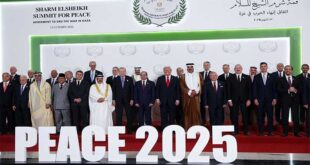By Abdel Bari Atwan
Whether peacefully or by war, the tragic situation in Syria is approaching an end-station in Idlib. The Syrian army is poised to launch an offensive to recapture the city with the support of Iranian and Hezbollah forces on the ground and Russian warplanes in the air. The Russian has meanwhile deployed over 25 naval vessels including two submarines in anticipation of possible US military intervention to prevent the city – the last major stronghold of Hay’at Tahrir ash-Sham (the Nusra Front) and other Salafi groups – from being brought back under the sovereignty of the Syrian state after a seven-year absence.
The build-up of American and Russian naval forces, whether in the eastern Mediterranean off the Syrian coast or in the waters of the Gulf (where the US’ allies are located), gives the impression that the two superpowers are preparing for a regional or global military confrontation if no political settlement is reached, or if the Trump administration tries to stand in the way of the ‘liberation’ of Idlib.
The naval manoeuvres which the Russians held in the eastern Mediterranean recently, with Chinese participation, were the biggest of their kind in 40 years. This means that the possibility of a clash with the US is real, that the Russian leadership has made its calculations carefully, and that it will not sacrifice the huge accomplishment it has achieved in Syria.
***
The prospect of war was heightened by President Donald Trump’s tweet earlier this week in which he warned President Bashar al-Asad not to attack Idlib, and also by Russia’s dismissive response to the warning. Trump tweeted: “The Russians and Iranians would be making a grave humanitarian mistake to take part in this potential human tragedy. Hundreds of thousands of people could be killed. Don’t let that happen!” President Vladimir Putin’s spokesman Dmitri Peskov retorted defiantly that the presence of armed factions in Idlib undermines the peace process in Syria and has turned the city into a base for attacks on Russian forces in their air and naval bases at Hmeimim and Tartous — a reference to the escalation of drone and missile attacks targeting the two sites in recent weeks.
Trump did not issue similar warnings during the Syrian army’s offensives to recover Aleppo or Deraa. His administration sufficed with a policy of tacit acceptance. So why has the US president suddenly broken with this practice, sent his fleets sailing towards Syria’s shores, and threatened a devastating response if chemical weapons are used – something the Russians have insisted is absolutely out of the question?
A clear reply was provided by two strategic experts, one British and the other American, with whom I shared a talk-show panel on the RT television channel this week: It is Israel and Saudi Arabia who have incited Trump to take this hawkish escalatory stance, because they do not want the Syrian-Russian-Iranian alliance to be victorious or Russia to achieve its objectives in Syria. Chief among these are securing the return of refugees and putting in place a new, consensual and democratic structure for the Syrian state based on a reconciliation that consolidates its security and stability.
Israel has failed in its efforts to terminate the Iranian presence in Syria, whether by putting pressure on Moscow to achieve that ends on its behalf or by launching repeated air and missile attacks on Iranian military targets in the country. It sees an American assault, using the Idlib crisis as a pretext, as its last chance in this regard. An agreement on the matter may well have been reached during last week’s visit to occupied Jerusalem by John Bolton, Trump’s National Security Advisor and Israel’s fiercest ally, for talks with his Israeli counterpart along with Netanyahu and a group of generals.
This may also explain the reaction of Avigdor Lieberman, the Israeli minister of war, to the news that Iranian Defence Minister Amir Hatemi had visited Syria, where he met with Asad, toured Aleppo, and signed an agreement with the Syrian government about the legal status of Iranian forces in Syria. Lieberman feigned outrage and warned that Israeli missile attacks on Iranian targets may henceforth no longer be confined to Syria, where the Israelis have repeatedly attacked Iranian bases, but could extend to other places such as Iraq.
Trump can rest assured about one thing, namely that if a confrontation were to flare against Russia in Idlib, most if not all of the costs would be covered by Saudi Arabia and some other Gulf states especially the UAE. This is likely to be a major topic at the talks the Emir of Kuwait Sheikh Sabah al-Ahmad holds with Trump in Washington this week, in addition of course to the Gulf crisis.
The coming few days will be crucial for the issue of Idlib and its environs. If the fevered efforts currently being made to arrive at a political solution acceptable to all parties do not succeed, a military solution will become inevitable and could develop into a regional or even broader war.
If peace proves elusive, Friday’s three-way Russian-Turkish-Iranian summit could become a council of war, and there have been several indications that the Syrian army plans to begin its all-out offensive immediately afterwards.
***
Turkey fears the prospect of an influx of two million refugees from Idlib, including armed militants and Nusra members, across its borders seeking safety. It also fears that a Syrian/Russian bombardment of the city would destroy the ethnic Turkish client groups based in the area, both Syrian and non-Syrian, that it sponsors. However, Ankara’s decision last week to belatedly designate Tahrir ash-Sham as a terrorist organization suggests that it is willing to see that group eliminated as a first step, and afterwards seek political and military understandings with the Russians and the Iranians in the city. That would imply that Turkey’s acquiescence to the Idlib offensive is all but guaranteed.
The Syrian authorities are resolute in their determination to recover the city, the last important area remaining outside government control, whatever the cost. Syrian spokespeople ridicule Trumps’ professed humanitarian concerns. They note that his forces flattened Mosul and al-Raqqa over the heads of their civilian inhabitants in order to destroy the Islamic State group, and did not allow a single fighter to escape alive. His Republican predecessors meanwhile killed over a million Iraqis through war and sanctions. The US, as one senior official told this paper, is in no position to lecture anyone about a ‘human tragedy’.
A political solution that prevents the shedding of the blood of innocents while bringing Idlib back into the fold of the Syrian state is to be earnestly hoped for. But hopes are one thing and the reality is very different. In terms of the human cost, we can only place our hands on our hearts and anticipate the worst. The coming few days will be decisive For Syria, and could, as we have said before, determine the future of the entire Middle East.
 Geostrategic Media Political Commentary, Analysis, Security, Defense
Geostrategic Media Political Commentary, Analysis, Security, Defense





